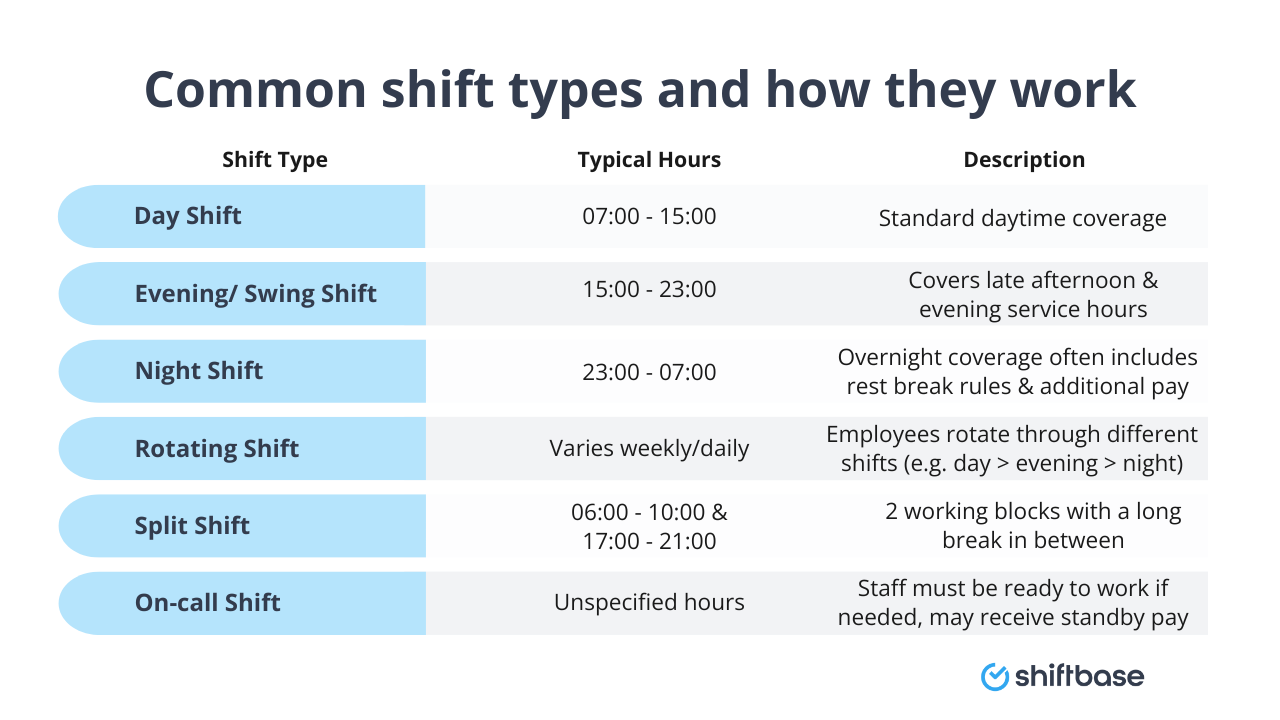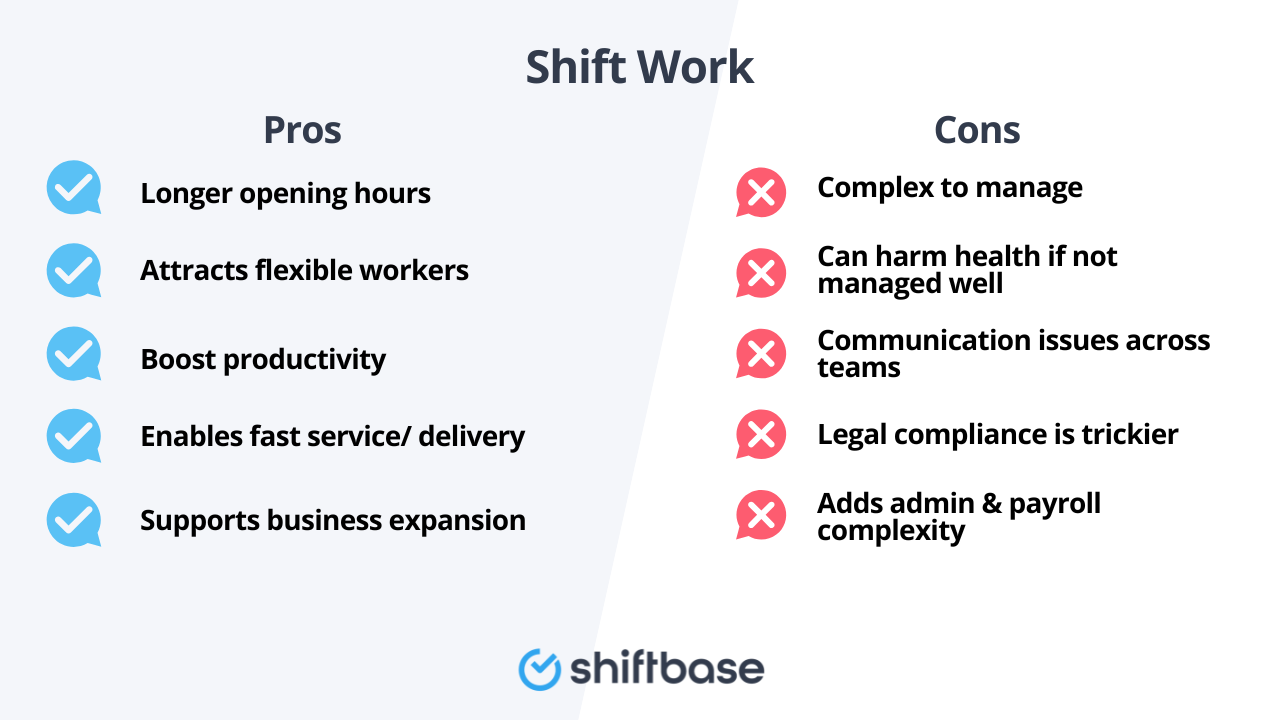From discussing the different types of shifts work schedule available to outlining tips on staying healthy when working unconventional hours – this guide looks at everything you need to know about shift work.
What is shift work?
Shift work is a way of organising working hours so your business can run outside the standard 9 to 5. Instead of all staff working the same hours, you split the day (and sometimes night) into ‘shifts’ and assign different people to each one. It’s common in industries like healthcare, hospitality, manufacturing, retail, transport, and security—anywhere that needs round-the-clock coverage.
In short: someone’s always on the clock, even if it’s 3 a.m.
A few common shift patterns:
- Day shift – usually between 7 a.m. and 3 p.m. (roughly)
- Evening or swing shift – around 3 p.m. to 11 p.m.
- Night shift – typically 11 p.m. to 7 a.m.
- Rotating shifts – where workers cycle through different shift times over a set period
- Split shifts – where an employee works two separate blocks of time in a day
- On-call shifts – when staff must be available to work if needed, but may not actually be called in
⚠️ Shift work doesn’t always mean 24/7 operations. Some employers simply use it to cover extended hours (say, 7 a.m. to 10 p.m.) or manage part-time or weekend work more flexibly.

Types of shift work
Here are 3 basic types of shift work
- Day shift – this is the most common type of shift and involves working during the day. Most shift jobs involve a day shift rotation with an eight to twelve-hour shift.
- Night shift – night shift workers are required to work nights, usually between 11 pm and 7 am.
- Afternoon shift – This shift is when workers are required to work in the afternoon, usually from 3 pm to 12 am.
Other types of shift work schedules
- Fixed shifts: Employees who work a fixed shift will likely have the same weekly days and hours. Exceptions could be made if they are needed to cover overtime shifts, take holidays off or switch up their schedule from time to time; however, most employees with this kind of arrangement can anticipate that their calendar won't surprise them too often.
- Split shifts: Employees who work split shifts will have two or more shift days with breaks in between. For example, an employee may start at 8 am, finish at midnight, and then return to work later that afternoon for another shift from 4 pm to 8 pm.
- Rotating shifts: Employees who work rotating shifts may experience a day shift one week followed by work night shifts the next. This shift work schedule can benefit those who want to maximize their hours. However, adjusting to the constantly changing schedule cannot be easy.
- On-call shift: Employers rely on employees who are available to work during their on-call shifts, even though they may not physically be at the workplace. Employees must stay accessible by phone as outlined in company policy and can expect to arrive quickly if summoned.
Useful Read: Schedule Rotation Generator + FREE Template
Shift work laws in the UK
Shift work is legal in the UK, but there are rules you must follow to protect your workers’ health, safety, and rights. Most of these come from the Working Time Regulations 1998, but there are new changes on the way with the Employment Rights Bill expected to come into force by late 2025.
Let’s look at the key legal areas you need to know.
🕒 Maximum weekly hours
- The legal maximum is 48 hours per week, averaged over 17 weeks.
- Workers can opt out of the 48-hour limit in writing if they wish.
- You must keep records of working hours—especially important for shift patterns where hours can change each week.
💡 Tip: Use scheduling software to track this automatically and stay compliant.
💤 Rest breaks and recovery time
Whether someone works regular office hours or the night shift, they’re entitled to:
- 11 hours of rest between shifts (minimum)
- 24 hours off per week or 48 hours off per fortnight
- A 20-minute break if the shift lasts over 6 hours (This can be unpaid—but must be uninterrupted)
⚠️ For night workers, additional health protections apply.
Useful Read: What Actually Counts as ‘Working Time’ For Paid Breaks and Split Shifts?
🌙 Night work rules
A night worker is anyone who works at least 3 hours between 11 p.m. and 6 a.m. regularly. As an employer, you must:
- Limit night shifts to an average of 8 hours in a 24-hour period
- Offer a free health assessment before assigning night work, and regularly after
- Keep records proving you’re within limits
⏱️ Predictable shifts and fair notice (NEW in 2025)
The Employment Rights Bill is changing how shift workers are protected. Once in effect, you’ll need to:
- Give reasonable advance notice of shifts (final rules are still in consultation but expect at least 7 days)
- Provide compensation if a shift is cancelled at short notice (e.g. within 24 hours)
- Honour requests for predictable working patterns after 26 weeks of service (This includes zero- or low-hours workers requesting a more stable contract)
👷 Agency workers and shift work
Under the new bill:
- If you use agency workers, both the agency and the hirer can be held responsible for breach of shift rights.
- Agencies will need to give clear shift terms in writing, and end-hirers must avoid last-minute cancellations.
The pros and cons of shift work
Shift work isn’t just about covering the late-night pizza rush or keeping the factory running at 3 a.m. It comes with real upsides—and some not-so-small challenges. Let’s unpack both sides.
👍 The pros of shift work
- Your business stays open longer: Need to serve more customers, meet tighter deadlines, or handle 24/7 operations? Shift work lets you extend your hours without burning out a single team.
- Better flexibility for employees: Some people want to work nights, weekends, or split shifts to fit around childcare, studies, or a second job. Offering a variety of shifts helps attract and keep a wider talent pool.
- Improved productivity: Smaller shift teams can mean fewer distractions, less crowding, and clearer roles. That’s especially true in production, logistics, or customer support.
- Quicker response times: Round-the-clock cover means fewer bottlenecks, quicker problem-solving, and better service delivery—especially useful for healthcare, IT support, and emergency services.
- It supports business growth: Want to expand into new markets or time zones? Shift work gives you the workforce structure to do it—without building a new office.
👎 The cons of shift work
- It’s hard to manage (if you don’t have systems): Keeping track of hours, avoiding back-to-back shifts, covering gaps—it’s a puzzle. Without software or clear processes, it can easily spiral into chaos.
- It can affect employee health: Night shifts and rotating schedules mess with people’s sleep, diets, and social lives. Over time, that can mean fatigue, poor mental health, or higher absenteeism.
- Communication gaps are common: Not everyone’s on site at the same time. That makes it harder to share updates, train staff, or build team spirit—unless you’re intentional about it.
- Legal risks go up: With changing schedules, night hours, and new laws coming in (hello, 2025 Employment Rights Bill), there’s a lot to track. One wrong move and you could be breaching someone’s rights.
- Higher admin workload: From rota changes to payroll adjustments (hello, shift differentials), shift work tends to create more paperwork unless you’ve automated it.

What is shift work disorder?
Shift Work Disorder (SWD) is a sleep condition that happens when someone’s work schedule is out of sync with their natural body clock. It’s most common in night workers, rotating shifts, or anyone working outside the usual 7 a.m. to 7 p.m. window.
Common signs of SWD:
- Trouble falling asleep (even when off shift)
- Waking up too early and feeling exhausted
- Brain fog, slow reaction times, irritability
- Low mood or signs of depression
- Falling asleep at work (or worse, while driving home)
⚠️ Not just feeling a bit tired—it’s a recognised medical condition that can seriously impact performance, safety, and mental health.
Who’s at risk?
Anyone doing:
- Night shifts
- Early morning shifts (before 6 a.m.)
- Rotating schedules with little recovery time
- Long shifts or frequent overtime
People over 40 and those with existing sleep issues are at higher risk too.
Why employers should care
Besides being the right thing to do, ignoring SWD can lead to:
- More mistakes and workplace accidents
- Higher absenteeism and sick leave
- Burnout and resignations
- Poor customer service or slower operations
- Legal risks if you’re not offering required breaks and health checks
How to reduce the risk of shift work disorder
Here’s what you can do as a manager or business owner:
✅ Design smarter rotas
- Avoid quick turnarounds (e.g. late → early)
- Let people recover after night shifts (1–2 days minimum)
- Use forward-rotating shifts (morning → afternoon → night) instead of backward
- Offer fixed shifts for night workers if possible (routine helps the body)
✅ Support better sleep
- Educate staff about sleep hygiene (cool rooms, black-out curtains, screen limits)
- Offer paid breaks so they’re not running on fumes
- Encourage naps before night shifts if it suits the role
✅ Offer regular health checks
This is required by law for night workers, but it’s good practice for all shift staff. Spot issues early and adjust schedules if needed.
✅ Check in with your team
Ask how people are coping. Quiet signs of SWD often show up before sick days start piling in.

- Create rosters quickly
- Insight into labor costs
- Access anywhere via the app

How Shiftbase helps you manage shift work with ease
If you're juggling rotating schedules, late shift changes, and keeping track of who’s in and who’s off—Shiftbase can save you hours (and headaches).
With our employee scheduling tools, you can build compliant rotas in minutes, not hours. Set up templates, assign roles, and get alerts if someone’s working too many hours or not getting enough rest. It’s built with UK labour laws in mind, so staying on the right side of regulations is easy.
Need to track time accurately across different shifts? Our time tracking feature lets employees clock in and out via mobile or terminal, while you get real-time reports on hours worked—perfect for avoiding surprise overtime or missed breaks.
And when someone calls in sick or books a holiday? Our absence management feature syncs it all with the rota automatically. No more double-booking or manual updates.
🎯 Whether you run a care home, restaurant, warehouse, or call centre—Shiftbase helps you stay compliant, reduce admin, and keep your team running like clockwork.
👉 Try Shiftbase free for 14 days here—no strings, just smarter shift management.
